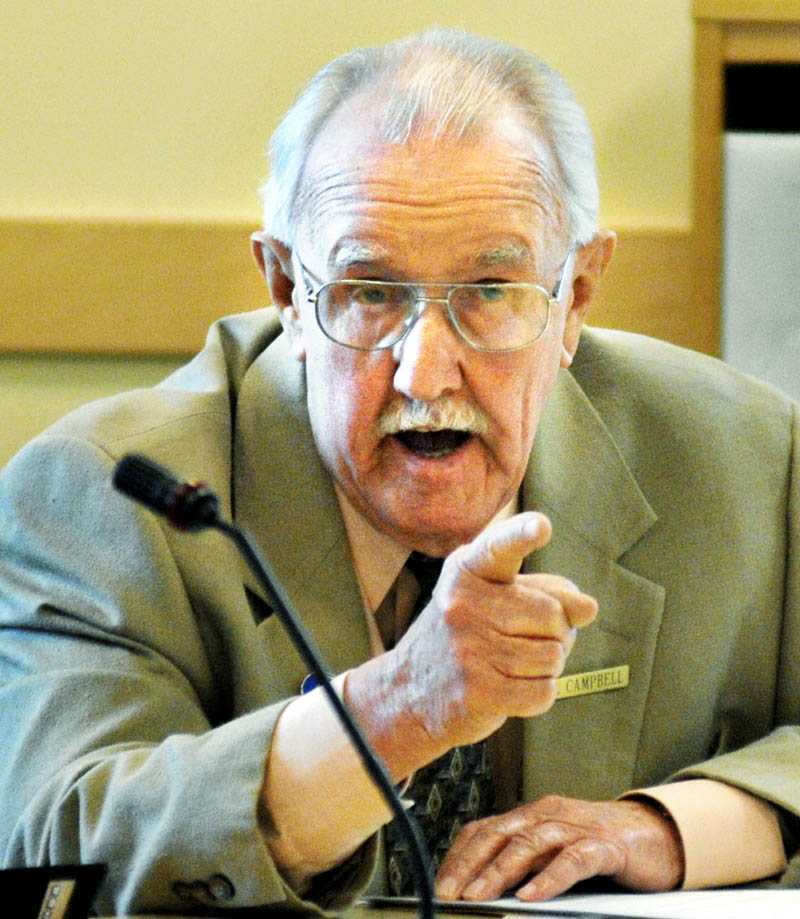AUGUSTA — Labor and business interests squared off Monday over proposals to prohibit labor agreements from requiring workers to join unions or pay union dues as a condition of employment.
Like debates over so-called right-to-work bills in other states, Monday’s hearing before the Labor, Commerce, Research and Economic Committee was contentious, with members on opposite sides of the issue getting admonished by a co-chair for their treatment of speakers.
Rep. Lawrence Lockman, R-Amherst, is sponsoring two right-to-work bills, which are expected to go down to defeat, with Democratic majorities in Maine’s House and Senate.
The issue has caused political battles in other states, including Michigan, which last week became the 24th right-to-work state.
Together, Lockman’s bills would affect both public-sector and private-sector employees.
L.D. 831 would prohibit mandatory membership in a union or payment of union dues as a condition of employment.
L.D. 786 would eliminate a provision in state law that automatically deducts public-sector union dues from state workers’ paychecks, regardless of whether they are members of the union.
“Simply put, workers should not be coerced into paying for services they don’t want and didn’t ask for,” Lockman testified, citing economic benefits such as job growth in other right-to-work states.
Linda Anthony of Lisbon, a toll collector for the Maine Turnpike Authority, said she wants the option of not paying dues to the Maine State Employees Association. After she filed a grievance against the union for nonrepresentation, she said, she was bullied by members — three times getting nails in her tires.
“I’ve worked in a hostile workplace for over a year,” she said. “I can never terminate MSEA from being my agent under present law.”
But Tim Belcher, counsel for the union, said in written testimony that under the proposals, nonunion employees who didn’t pay dues would get the same benefit as those who chose to pay.
“The union represents all employees who share that community of interest, and is required to represent everyone in the bargaining unit, including nonmembers,” Belcher said.
The Maine State Employees Association says it represents 12,000 state workers, including 2,500 who are not members but pay dues.
Under Lockman’s bills, unions would have to represent only employees who pay dues. Rob Walker, executive director of the Maine Education Association, said in written testimony that having employees cut away from the union to make their own deals may raise the risk of employment discrimination lawsuits, if terms aren’t comparable.
Assistant Senate Majority Troy Jackson, D-Allagash, said employees who don’t pay for union representation and “sit back and say, ‘Gimme, gimme, gimme,’ would get the best deal.”
At different times, John Patrick, D-Rumford, the committee’s Senate chairman, admonished two committee members. Rep. James Campbell, a liberal independent from Newfield, and Rep. Amy Volk, R-Scarborough, were the most vocal members on opposite sides of the issue.
After Gov. Paul LePage’s economic adviser testified about seeing positive effects of right-to-work laws in Southern states while he was in the private sector, Campbell said, “If all that stuff was so great in those states you just mentioned, why didn’t you just stay there?”
Patrick ruled Campbell out of order.
Three union groups, the Maine State Employees Association, the Maine Education Association and United Association Local 716, a plumbers’ and pipefitters’ union, donated $850 to Campbell’s 2012 campaign — 25 percent of his total — through political action committees. Representatives of those unions testified against the bills on Monday.
Eric Brakey, chairman of the libertarian Defense of Liberty political action committee and a backer of the right-to-work bills, noted those contributions and accused Campbell of intimidation tactics.
“Who’s he representing? The unions or the people of his district?” Brakey said during the hearing.
After Brakey’s question was ruled inappropriate, Campbell fired back. “I’m not going to sit here for one minute, Buster, and have you accuse me of anything,” he told Brakey. “Do I support the unions? You bet your life I do.”
Patrick admonished Volk for a question she asked about labor contributions to the campaign of Rep. Joshua Plante, D-Berwick, who ran a taxpayer-funded Clean Election campaign and testified against the bills.
There are now 24 right-to-work states, according to the National Conference of State Legislatures. Most of their laws were enacted in the 1940s and 1950s; four states have enacted the provisions since 1985.
Lockman’s bills would make Maine the only right-to-work state in New England.
The LePage administration, through Doug Ray, a spokesman for the Department of Economic and Community Development, said the proposals aren’t a “be all, end all” to economic development, but they would distinguish Maine as a job creator.
An analysis of data by The Wall Street Journal in December said right-to-work laws cut both ways: While those states have more jobs, wages are lower.
It said private employment grew nearly 5 percent in right-to-work states in the preceding three years, compared with nearly 4 percent in other states. But private-sector wages in right-to-work states were nearly 10 percent lower than in other states in the preceding year, the newspaper said.
The Congressional Research Service, Congress’ nonpartisan research arm, cited similar findings in a report in December, including a unionization rate more than 50 percent lower in right-to-work states.
Michael Shepherd can be contacted at 370-7652 or at:
mshepherd@mainetoday.com
Correction: This story was revised at 12:15 p.m., April 2, 2013, to correctly quote Rep. James Campbell, I-Newfield, who said, “If all that stuff was so great in those states you just mentioned, why didn’t you just stay there?”
Send questions/comments to the editors.


